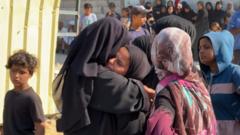As the humanitarian crisis in Gaza escalates, the Israel Defence Forces (IDF) have implemented several initiatives aimed at addressing international condemnation of their policies. These measures, which include allowing airlifts of aid and the establishment of temporary humanitarian corridors, are seen by many as a reaction to mounting pressure from global allies. However, skepticism persists regarding the efficacy and motives behind these actions, as locals continue to face dire circumstances.
Israel's Humanitarian Measures: A Response to International Outcry Over Gaza Starvation

Israel's Humanitarian Measures: A Response to International Outcry Over Gaza Starvation
Israel announces new humanitarian aid measures amid global criticism over its handling of the Gaza crisis, but responses reveal deeper tensions.
The IDF recently reported its first airdrop of aid into Gaza, with the United Arab Emirates joining efforts shortly after. Critics argue that these gestures are insufficient and accuse Israel of "whitewashing" its image while still conducting military operations that impact civilians. Reports have emerged of tragic incidents during designated pauses in military action, illustrating the complexity of claims surrounding humanitarian efforts and military engagement.
While Israel maintains that it does not restrict aid shipments, statements from close allies like the UK, France, and Germany highlight a growing consensus that calls for urgent humanitarian action. The establishment of the Gaza Humanitarian Foundation, a system developed with U.S. collaboration, has faced resistance from organizations such as the UN, raising questions about accountability and the handling of aid.
The collapse of trust between humanitarian agencies and the Israeli government signifies deeper issues, particularly concerning safety on the ground and the obstacles to aid transit. Observers emphasize that while air drops might provide some immediate relief, they cannot replace a well-structured, ongoing aid strategy needed to alleviate the humanitarian catastrophe.
As reports document the harrowing conditions faced by Palestinians—where hunger persists and aid is scarce—critics warn that air drops are merely superficial solutions. Ultimately, only a ceasefire and long-term commitments can address the underlying humanitarian needs in Gaza.
In light of the humanitarian crisis and allegations concerning the war crime of starvation, political figures in Israel, including Prime Minister Netanyahu, face growing scrutiny. As international pressure mounts, navigating the intricate balance between military strategy and humanitarian obligations remains a significant challenge for Israel.
The situation in Gaza illustrates the broader implications of military conflict on civilian populations and underscores the urgent need for comprehensive and ethical humanitarian responses in crisis situations.
While Israel maintains that it does not restrict aid shipments, statements from close allies like the UK, France, and Germany highlight a growing consensus that calls for urgent humanitarian action. The establishment of the Gaza Humanitarian Foundation, a system developed with U.S. collaboration, has faced resistance from organizations such as the UN, raising questions about accountability and the handling of aid.
The collapse of trust between humanitarian agencies and the Israeli government signifies deeper issues, particularly concerning safety on the ground and the obstacles to aid transit. Observers emphasize that while air drops might provide some immediate relief, they cannot replace a well-structured, ongoing aid strategy needed to alleviate the humanitarian catastrophe.
As reports document the harrowing conditions faced by Palestinians—where hunger persists and aid is scarce—critics warn that air drops are merely superficial solutions. Ultimately, only a ceasefire and long-term commitments can address the underlying humanitarian needs in Gaza.
In light of the humanitarian crisis and allegations concerning the war crime of starvation, political figures in Israel, including Prime Minister Netanyahu, face growing scrutiny. As international pressure mounts, navigating the intricate balance between military strategy and humanitarian obligations remains a significant challenge for Israel.
The situation in Gaza illustrates the broader implications of military conflict on civilian populations and underscores the urgent need for comprehensive and ethical humanitarian responses in crisis situations.




















